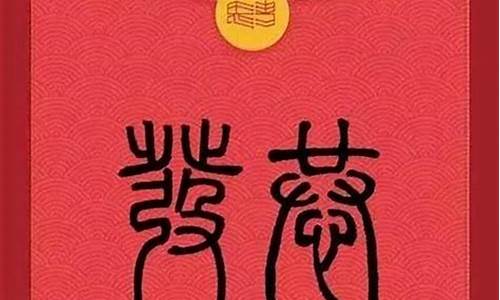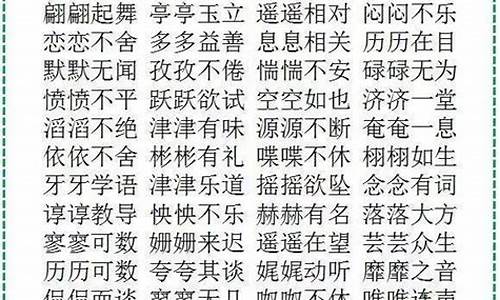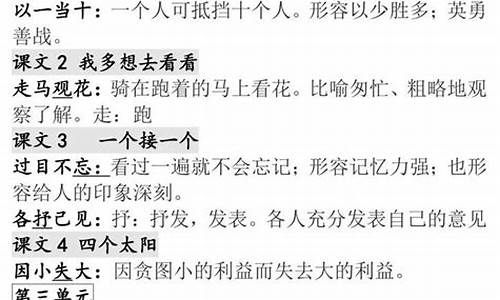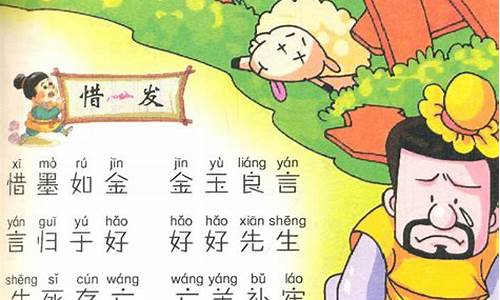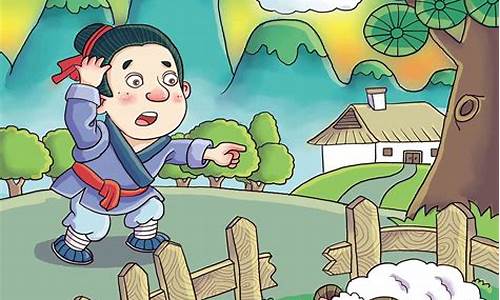您现在的位置是: 首页 > 成语解释大全 成语解释大全
用英语讲述一个成语故事_用英语讲述一个成语故事作文
ysladmin 2024-06-06 人已围观
简介用英语讲述一个成语故事_用英语讲述一个成语故事作文 希望我能够回答您有关用英语讲述一个成语故事的问题。我将根据我的知识库和研究成果回答您的问题。1.成语故事英语剧本2.求四个字的成语故事英语的3.谁有英语汉代成语故事?4.英语
希望我能够回答您有关用英语讲述一个成语故事的问题。我将根据我的知识库和研究成果回答您的问题。
1.成语故事英语剧本
2.求四个字的成语故事英语的
3.谁有英语汉代成语故事?
4.英语英语成语故事之自相矛盾
5.用英语说成语故事急,要短的,长的不行
6.英语成语故事中英对照

成语故事英语剧本
英语成语故事-井底之蛙
The Frog in the Shallow Well (Jing Di Zhi Wa)
Have you not heard of the frog that lived in a shallow well? It said to a turtle that lived in the East Sea, "I am so happy! When I go out, I jump about on the railing beside the mouth of the well. When I come home, I rest in the holes on the broken wall of the well. If I jump into the water, it comes up to my armpits and holds up my cheeks. If I walk in the mud, it covers up my feet. I look around at the wriggly worms, crabs and tadpoles, and none of them can compare with me. Moreover, I am lord of this trough of water and I stand up tall in this shallow well. My happiness is full. My dear sir, why don't you come often and look around my place?"
Before the turtle from the East Sea could get its left foot in the well, its right knee got stuck. It hesitated and retreated. The turtle told the frog about the East Sea.
"Even a distance of a thousand li cannot give you an idea of the sea's width; even a height of a thousand ren cannot give you an idea of its depth. In the time of King Yu of the Xia dynasty, there were floods nine years out of ten, but the waters in the sea did not increase. ln the time of King Tang of the Shang dynasty there were droughts seven years out of eight, but the waters in the sea did not decrease. The sea does not change along with the passage of time and its level does not rise or fall according to the amount of rain that falls. The greatest happiness is to live in the East Sea."
After listening to these words, the frog of the shallow well was shocked into realization of his own insignificance and became very ill at ease.
=============================
英语故事:惊弓之鸟
A Bird Startled by the Mere Twang of a Bow-String
This set phrase figuratively denotes those who have suffered disasters and so have a lingering fear when anything happen.
During the War Period ,in the Wèi State there lived a famous archer named Gēng léi.
One day,Gēng léi and the King of Wei standing on a high terrace saw some birds flying past.
At this Gēng léi said to the King:"I'll shoot a flying bird down for YourMajesty by drawing a bow with no arrow."
The King asked,"Is it possible that one's archery can attain such a level?"
A little later,a wild goose was flying from the east.
Gēng léi just drew his bow but didn't shoot an arrow.
As expected,the wild goose fell to the ground with the twang.
The King asked in surprise,"How can your archery reach such a high level?"
Gēng léi replied ,"This wild goose has been wounded."
The King got more surprised,asking,"How do you know it,sir?"
Gēng léi esplained,"This wild goose flew slowly and cried sadly.Its flying slowly suggested that it was still aching with the old wound; its crying sadly suggested that it had strayed long from its flock.When it heard the twang the wild goose had to flutter hard to fly high for its life.So it is evitably fell down with its old wound burst."
=============================
刻舟求剑
Making His Mark (Ke Zhou Qiu Jian)
A man from the state of Chu was crossing a river. In the boat, his sword fell into the water. Immediately he made a mark on the boat.
"This is where my sword fell off," he said.
When the boat stopped moving, he went into the water to look for his sword at the place where he had marked the boat.
The boat had moved but the sword had not. Is this not a very foolish way to look for a sword?
A man from the State Chu was crossing the river. In the boat, his sword fell
into the water by his carelessness. Imediately he made a mark on the boat.“This
is where my sword fell off.”He said. When the boat stopped, he jumped into the
water to look for his sword at the place where he marked the boat. The boat had
moved but the sword had not. Is this not a foolish way to look for a sword?
刻舟求剑
求四个字的成语故事英语的
如果觉得学英语觉得枯燥的话,可以加点乐趣的元素进去。我在此献上英语故事,希望对你有所帮助。
成语寓言故事:Playing the Lute to a Cow对牛弹琴
Gong Mingyi was a famous musician in ancient times, who played the lute very well.
公明仪是古代一位很有名的音乐家,弹得一手好琴。
One day, while playing the lute indoors, Gong Mingyi saw a cow eating grass leisurely outside the window. He had a sudden whim to play some melodies for the cow. He first played the "Exercise of Qing Jiao", but the cow still kept on eating grass with head lowered. He seemed to realize that the melody was too highbrow for the cow to understand.
有一天,他在室内弹琴,看见一头牛在窗外悠闲地吃著草。他忽然想弹几曲给牛听听。他先弹了一曲“清角之操”。可是,牛还是跟刚才一样,只顾低着头吃草。他似乎意识到,这支曲子太高雅了,牛没有听懂。
So he played several other melodies, imitating the buzzing sounds of swarms of flying mosquitoes, and the bleats of a calf looking for its panions. At this, to his surprise, the cow stopped eating grass, but raised its head, pricked up its ears, wagged its tail and, pacing up and down in *** all steps, began to listen attentively.
于是,他弹了另外几支曲子,模拟蚊子成群结队飞来飞去的嗡嗡声;模拟小牛犊寻找伙伴的眸眸叫唤声。这样一来,这头牛竟然不吃草了,抬起头,竖着耳朵,甩著尾巴,迈著小步,留心地倾听起来。
成语寓言故事:The Gentleman on the Beam梁上君子
One year in the Eastern Han Dynasty, there was a serious famine in I-Jenan.
东汉时的某一年,河南一带,饥荒严重。
One night, a thief sneaked into Chen Shi's house and hid himself on the beam. When Chen Shi was aware of this, he got out of bed without haste, called his children and grandchildren to his room and said in a stern voice:
一天夜里,一个小偷潜人陈宴家,躲藏在屋子的横梁上。陈宴觉察到后,不慌不忙地起了床,把儿女子孙们都叫到屋里,严厉地说:
"One must always restrain and encourage oneself no matter under what circumstances. Bad men were not born bad. It is only bee they don't restrain themselves that they develop bad habits and turn bad gradually. That gentleman on the beam is just a case in point."
“一个人无论在什么情况下,都要克制自己,勉励自己。坏人,不是天生就坏,而是因为平时不克制自己而养成了坏的习惯,才慢慢地变坏的。那位梁上君子就是这样。”
Much ashamed upon hearing this, the thief hiding on the beam promptly jumped down to the ground, kowtowed and begged for forgiveness.
躲在梁上的小偷听了,很惭愧,连忙翻身落地,磕头求饶。
Chen Shi enlightened him by saying:
陈宴开导他说:
"Judging from your appearance, you don't look like a bad man. Perhaps you are driven by poverty to steal. But you should carefully examine yourself and turn over a new leaf."
“看你的样子并不像坏人,你这样做,恐怕也是被贫困逼出来的。不过你应当好好反省,改邪归正。”
Then he immediately asked someone to bring two bolts of white silk to give the thief as a present. The thief kowtowed and thanked him repeatedly.
接着,他马上叫人拿来两匹白绢赠送给小偷。小偷不停地磕头致谢。
Since then, very few thefts occurred in this locality.
从此以后,这个地方很少发生偷盗的事情。
成语寓言故事:Cutting the Fabric to Admonish the Hu *** and断织诫夫
A long time ago, in Henan there was a young man named Le whose family was very poor.
从前,河南有个青年,名叫乐羊子,家里很穷。
One day, Le Yangzi picked up a piece of gold on the road. He happily took it home and gave it to his wife. His wife said in all seriousness:
有一天,乐羊子在路上拾到一块金子,高高兴兴地拿回家,交给妻子。妻子却一本正经地说:
"I heard that men with aspiration do not drink from the Dao ***meaning steal in Chinese*** Spring, and honest men do not take handout food. Furthermore, picked-up money and things will stain one's moral character."
“我听说,有志气的人不喝盗泉之水,廉洁的人不吃磋来之食;何况,这拾来的钱物,会玷污一个人的品德!”
Hearing this, Yangzi was very ashamed of himself. So he threw the piece of gold away in the open field.
乐羊子听了妻子的话,心里感到非常惭愧,就把金子扔到野外去了。
This incident touched Le Yangzi deeply. He made up his mind to leave home and go to a faraway place to study under a master.
这件事,对乐羊子的触动很大。他下了决心,离家去很远的地方,拜老师学习。
One year later, Le Yangzi returned home. His wife inquired why he returned so soon. Le Yangzi *** iled and said:
一年以后,乐羊子回到家里。妻子询问丈夫为什么这么快就回来了。乐羊子笑着说:
"There is no other reason except that I, being all alone away from home, miss you so much that I e back."
“没有别的原因,只是一个人在外面太想念你了,所以就回来了。”
His wife turned pale at his words. She took up a knife, ran to the silk loom, put the knife on the silk fabric woven from natural silk, and said to Le Yangzi in an agitated tone:
妻子一听,脸色变得刷白。她顺手拿起一把刀,奔到丝织机前,把刀放在蚕丝织成的绸面上,激动地对乐羊子说:
"I reeled silk strand by strand from cocoons and, with the shuttle moving to and fro, weaved it inch by inch into this bolt of silk fabric. Now if I should cut the fabric with the knife, all the previous efforts and time I've devoted would be wasted. While studying, you should always remind yourself that there is yet much more to learn. Only in this way can you cultivate a noble moral character. If you give up halfway, it will be just like cutting up this silk fabric at one stroke."
“这丝绸,是我从蚕茧缴成丝线,一丝一缕,一梭子来,一梭子去,一寸一寸地织,才织成这一匹的啊!现在,我假使一刀割断这匹丝绸,岂不前功尽弃,白白地浪费了时间吗?你呀,读书求知识,也应该随时提醒自己学得还很不够,这样才能养成高尚的品德。如果你半途而废,那么跟一刀割断这匹丝绸又有什么两样呢!”
Deeply moved by his wife's words, Le Yangzi bid farewell to her at once, went to the faraway place, and made determined efforts to study hard. He had been away from home for a good seven years, and finally succeeded in his studies.
听了妻子的这番话,乐羊子深深地感动了。他马上告别了妻子,去远方发愤攻读,整整七年没有回家,最后终于学成功了。
谁有英语汉代成语故事?
英语故事:破镜重圆
A Broken Mirror Joined Together
This set phrase metaphorically means the reunion of husband and wife after an enforced separation or a rupture.
At the end of Southern Dynasties,when the Chen Dynasty was about to be overthrown.
Xú Déyán felt very worried.He foreknew that his wife Princess Lè Chāng was destined to separate from him.
His wife is the last Emperor Chén Shūbǎo's younger sister.
Hence he broke a round bronze mirror into halves.
One half is given to the Princess,the other half left with himself.
The couple agreed on it that the wife would pretend to sell the broked mirror in the street of Cháng'ān,the capital of the Suí Dynasty,on the Lantern Festival.
After the fall of Chén Dynasty,Princess Lè Chāng was captured and sent to Chang'an and forced to be a concubine-servant in the mansion of Yáng Sù.
Xú Déyán missed his wife very much and went to the captial to look for her.
On the 15th day of the first lunar month,he found a man selling half the mirror.
After asking the man,he knew that his wife had been a concubine-servant of Yáng Sù. Thinking that he could not see her again,he sighed a great sorrow.
Having known the matter,Yáng Sù felt much sympathy for the couple.He sent for Xú Déyán and told him to take wife away.Thus the husband and the wife were reunited into a happy couple.
英语英语成语故事之自相矛盾
一.刻舟求剑Making His Mark A man from the state of Chu was crossing a river. In the boat, his sword fell into the water. Immediately he made a mark on the boat. "This is where my sword fell off," he said. When the boat stopped moving, he went into the water to look for his sword at the place where he had marked the boat. The boat had moved but the sword had not. Is this not a very foolish way to look for a sword? 战国时,楚国有个人坐船渡江。船到江心,他一不小心。把随身携带的一把宝剑掉落江中。他马上掏出一把小刀,在船舷上刻上一个记号,说:“这是我宝剑落水的地方,所以我要刻上一个记号。” 船靠岸后,那楚人立即从船上刻记号的地方跳下水去捞取掉落的宝剑。捞了半天,仍不见宝剑的影子。其实他又怎么找得到宝剑呢?船继续行驶,而宝剑却不会再移动。像他这样去找剑,真是太愚蠢可笑了。 二 守株待兔Staying by a Stump Waiting for More Hares To Come and Dash Themselves Against It Staying by a Stump Waiting for More Hares To Come and Dash Themselves Against It This story took place more than 2,000 years ago,in the Warring States period(475-221 B.C.).Tradition has it that in the State of Song at that time there was a man who was famous for staying by a stump waiting for more hares to come and dash themselves against it. He was a yong farmer,and his family had been farmers for generations.Year after year and generation after generation, farmers used to sow in spring and harvest in autumn,beginning to work at sunrise and retiring at sunset.In good harvest years,they could only have enough food to eat and enough clothing to wear.If there was a famine due to crop failure,they had to go hungry. This young farmer wanted to improve his life.But he was too lazy and too cowardly.Being lazy and cowardly over everything,he often dreamed of having unexpected blessings. A miracle took place at last. One day in late autumn,when he was ploughing in the field,two groups of people were hunting nearby.As shoutings were rising one after another,scared hares were running desperately.Suddenly,a blind hare dashed itself headlong against the stump of a dead tree in his field and died. That day,he ate his fill. From that day on,he no longer went in for farming again.From morning till night,he stayed by that miraculous stump,waiting for miracles to take place again. This story comes from"The Five Vermin"in The Works of Han Feizi.Later generations often use the set phrase"staying by a stump waiting for more hares to come and dash themselves against it"to show grusting to chance and windfalls or dreaming to reap without sowing.It is also used to show adhering to narrow experiences and not being able to be flexible. 相传在战国时代宋国,有一个农民,日出而作,日入而息.遇到好年景,也不过刚刚吃饱穿暖;一遇灾荒,可就要忍饥挨饿了.他想改善生活,但他太懒,胆子又特小,干什么都是又懒又怕,总想碰到送上门来的意外之财。 奇迹终于发生了。深秋的一天,他正在田里耕地,周围有人在打猎。吆喝之声四处起伏,受惊的小野兽没命的奔跑。突然, 有一只兔子,不偏不倚,一头撞死在他田边的树根上。 当天,他美美地饱餐了一顿。 从此,他便不再种地。一天到晚,守着那神奇的树根,等着奇迹的出现。 成语“守株待兔”,比喻亡想不劳而得,或死守狭隘的经验,不知变通。 "An illusory snake in a goblet" is used to describe the psychological state of being frightened caused by taking illusions as reality. “杯弓蛇影”比喻把虚幻当作真实的恐惧心理。 ------------------------------------------------------- In Jin Dynasty there was a man named Yue Guang who was fond of drinking alcohol. 晋朝有个叫乐(yuè)广的人,爱喝酒。 One day, he invited a friend to his house to drink together. 一天,他邀请朋友到家里来对斟(zhēn)对饮。 Suddenly, his friend saw the reflection of a snack swimming in the goblet. 忽然,朋友看见酒杯里有条蛇影在游动。 He got so much frightened that he took ill on bed after getting home. 他受了惊吓,回去便一病不起。 And neither any doctor or any medicine could cure his illness. 请医服药,都无起色。 Yue Guang came to see him and asked about the cause of his disease. 乐广跑来看他,问明起病的缘由。 When he got to know the cause, he pulled his friend from the bed immdiately and took him to his house. 乐广听后一把拉起朋友往家走。 Yue Guang made his friend sit where he used to, pouring a goblet of alcohol for him, and asked him," Is there any snake reflection in the goblet?" 他让朋友坐在原处,斟满酒问:“有蛇影吗?” There was still a "snake reflection" in the goblet! Yue casually took away the bow hanging on the wall. 杯子里还有“蛇影”!乐广随手取下墙上的弓。 This time, the "snake reflection" disappeared. 这次,“蛇影”不见了! "So it was the bow reflection that was in the goblet!" His friend at once got well from his illness. “杯子里原来是弓影呀!”朋友的病情顿时好了! 天衣无缝 There was a man called Guo Han in the Tang Dynasty(618-907).One summer night, when the moon was very bright he suddenly saw a girl descending slowly from the sky. He observed the girl closely, and found that the dress she was wearing was seamless. He was puzzled, and asked why. The girl answered,"Heavenly clothes are not sewn with needle and thread." This idiom is used metaphorically to indicate the flawless handling of things. It can also be used to indicate a perfectly written poem or other literary article. 唐朝有个人教郭翰。一个夏天的晚上,月光非常明亮,他忽然看见天空中有个女子轻盈而缓慢地飘落下来。他仔细地观察那个女子,发现她身上穿的衣服连一条缝也没有,感到非常奇怪,便问那个女子。女子回答说:“天衣本来就用不着针线缝合的呀!” 这个成语用来比喻处理事情十分周密,不露一点痕迹。也比喻诗文写得很精辟,找不出一点毛病。 一丘之貉 In the Han Dynasty, there was an official called Yang Yun who was both capable and honest. Commenting on the assassination of a king of a small state, he said, “If a king refuses to follow the advice of a wise minister, he will suffer an unitimely death. The emperor of the Qin Dynasty trusted treacherous ministers, and therefore lost his state.” He compared kings and emperors to racoons living on the same mountain. This idiom refers derogatorily to people who are of the same kind. 汉朝时,有个叫杨恽的人,在朝廷做官,廉洁无私,有很有才能。有一次,他听说一个小国王被杀死,就发表议论说:“君王不采纳贤臣的计策,就会得到这种下场。秦朝皇帝宠信奸臣,所以亡国;如果重用贤臣,他的国家就不会灭亡了。”他最后总结说,古今的帝王都不过是一个山丘上的貉而已。 这个成语比喻某些人彼此相同,或者都是坏人。 黔驴技穷 从前,贵州没有驴子,有人从外地带回一头驴子,拴在山下,一只老虎看到了,以为是什么怪物,急忙躲到树林中去头头地瞧。驴子大叫一声,老虎吓了一跳,以为驴子要吃掉自己。时间一长,老虎觉得驴子没有什么恶意,逐渐走近去戏弄它,触犯它。驴子生气了,用蹄子踢老虎。老虎心里想:“你的本领不过就是如此啊!”于是立刻扑过去,一口把它咬死吃掉了。 这个成语比喻仅有的一点本事也用完了,在没有别的办法了。 The Guizhou Donkey Has Exhausted It's Tricks In ancient times there were no donkeys in Guizhou province. Somebody brought a donkey from somewhere and tied it to a tree at the foot of a mountain. A tiger saw the donkey, and thought that it must be a fearsome monster. It hide behind a tree and spied on the donkey. When the donkey brayed, the tiger was frightened, thinking that the donkey was about to devour it. After a while, seeing that the donkey had not moved, the tiger approached it and teased it. The donkey became angry, and kicked the tiger. The tiger thought to itself:"It then all it is capable of?" It then jumped on the donkey and ate it. This idiom is used to mean that one has exhauseted one's skills.
用英语说成语故事急,要短的,长的不行
自相矛盾
A man of the state of Chu (chǔ guó 楚国) had a spear and a shield for sale.
楚国有个卖兵器的人,在市场上卖矛和盾。
He was loud in praises of his shield."My shield is so strong that nothing can pierce it through."
为了让人家愿意买他的货,他先举起盾向人们夸口道:“你们看,我的盾是世上最坚固的盾,任何锋利的东西都不能刺穿它。”
He also sang praises of his spear."My spear is so strong that it can pierce through anything."
接着又举起他的矛,向人吹嘘说:“你们再看看我的矛,它锋利无比,无坚不摧,无论多么坚硬的盾,都挡不住它,一刺就穿!”
"What would happen," he was asked, "if your spear is used to pierce your shield?"
人群中有人问道:“如果用你的矛去刺你的盾,结果怎么样?”
It is impossible for an impenetrable shield to coexist with a spear that finds nothing impenetrable.
这世界上一样无坚不摧的东西永远不会与一样什么都能摧毁的东西共存。
英语成语故事中英对照
画龙点睛。字面的意思是画龙之后再点上眼睛。这个成语多用于说话写作那么关于它的历史典故是怎样的呢?一起来看看吧:
Mr. Li is a good painter. One day he draws a beautiful dragon without eyes.
Mr. Zhou looks at the picture and says, “The dragon has no eyes. It isn’t a good picture.”
But Mr. Li smiles and says, “If I add eyes to the dragon, it will fly away.”
Mr. Zhou shakes head and says, “You are boasting. I don’t believe you.”
Mr. Li isn’t angry. He holds the paintbrush and adds eyes to the dragon. Woe! The dragon really flies.
李先生是位很好的画家。一天画了一条栩栩如生的龙,但是这只龙没有眼睛。
周先生见了说:“这条龙没有眼睛。这不算一张好画。”
可是李先生笑着说:“如果我给它加上眼睛,它就会飞走了。”
周先生摇头说:“你吹牛。我不相信。”
李先生也不生气,只是拿起笔给龙点上眼睛。哇!龙真的飞走了。
英语版中国成语故事带翻译,短一点
如果觉得学英语觉得枯燥的话,可以加点乐趣的元素进去。我在此献上 英语 故事 ,希望对你有所帮助。成语 寓言故事 :Losing One's Head忘乎所以
The gorillas in the valleys in the south often lived together in groups of several tens. They were fond of drinking wine, and even fonder of imitating man's behavior.
南方山谷里的猩猩,常常数十成群地生活在一起。它们喜欢喝酒,更喜欢模仿人的行为。
People knew very well their habits and often put wine or distiller's grains on the roadside together with many straw sandals connected together with ropes.
人们掌握了它们的习性,经常把酒或酒糟放在路边,旁边又放着许多草鞋,草鞋用绳索连接起来。
The gorillas knew this was a trick to lure them into traps and cursed:
猩猩知道这是人们引诱它们上当,便破口大骂:
"Humph! Do you think we don't know your tricks? We'll never be taken in!"
?哼!你们以为我们不知道吗?我们决不上你们的当!?
So they called one another, turned round and left.
于是,互相招呼,回头就走。
But they had already smelled the aroma of the wine, and couldn't bear to part with it. Even after they left, they would turn their heads to look back. When they saw no one there, they would turn back; and after they turned back, they were afraid of being deceived, and left again. After much hesitation, they finally said to themselves:
但是,它们已经闻到了酒香,总有点恋恋不舍,就是走了,也要回过头来望望。回头望不见人,便又转过来;转过来了又怕上当,再返身回去。犹豫了好久,它们最后自言自语地说:
"Just for a taste of the wine. It won't matter as long as we don't get drunk."
?去尝尝味道,不喝醉就不碍事。?
Shortly afterwards, they agreed to come back to drink the wine. When they got drunk, they forgot everything. Every gorilla put on the straw sandals and imitated the way man walks.
不一会儿,大家同意了,都回来喝酒。等到喝醉的时候,它们一切都忘记了,一个个穿上草鞋,学着人走路。
As a result, they fell down one after another and were all caught alive by people.
结果,一个个都跌倒了,统统被人活捉。
成语寓言故事:A Half Day's Leisure半日清闲
One day, a high official wanted to amuse himself in a temple.
一天,有一个大官,要到寺院里去游玩。
His subordinates notified the monks in the temple three days in advance to prepare a good meal on time. So all the monks in the temple busied themselves with the preparation.
他的手下人便在三天前就通知寺院里的和尚,准时备好饭菜。于是,寺院里所有的和尚,都忙着张罗了起来。
The temple was situated in a remote mountain, surrounded by bamboo groves, and very tranquil. After the high official had strolled about for a while, he was very pleased. While dining, he recited lines from a poem of the Tang Dynasty:
寺院坐落在深山里,四面都是竹林,的确非常清静。大官游玩了一番之后,非常高兴,一面吃饭,一面吟起了唐人的诗句:
"Passing through the bamboo courtyard and meeting a monk,A half day's leisure is gained in this fleeting life."
?因过竹院逢僧话,又得浮生半日闲。?
When the old monk heard these lines of the poem, he couldn't help laughing.
老和尚听了诗句,不觉笑了起来。
The high official asked hastily:
大官连忙问道:
"What are you laughing about?"
?你笑什么?
The old monk replied:
老和尚回答道:
"Your Honour have indeed gained a half day's leisure, but I have been busy for three whole days."
?您老人家固然清闲了半天,可是我老和尚却已经忙了整整三天!?
成语寓言故事:The Kingfisher Moves Its Nest翠鸟迁巢
In order to avoid calamities, at first the kingfisher always selects a high place to build its nest.
翠鸟起先为了避免灾祸,总是选择高的地方筑巢。
But when the young birds are hatched, it will move to a place a little lower to build its nest. This is because the kingfisher is particularly fond of its offspring and is afraid they而ght fall down from a high place.
但是,等到孵出小鸟以后,它就到少许低一点儿的地方筑巢。这是因为它特别爱护小鸟,生怕它们从高处摔下来。
When the young birds grow beautiful feathers, the kingfisher will become even fonder of them and more protective, so it will move its nest further downward, with the result that the young birds are easily taken away by people.
等到小鸟长出了美丽的羽毛以后,母鸟就更加喜欢和爱护它们了,于是又向下搬巢,结果小翠鸟却被人们轻而易举地掏走了。
塞翁失马Blessing or Bane
战国时期,靠近北部边城,住着一个老人,名叫塞翁。塞翁养了许多马,一天,他的马群中忽然有一匹走失了。邻居们听说这件事,跑来安慰,劝他不必太着急,年龄大了,多注意身体。塞翁见有人劝慰,笑了笑说:“丢了一匹马损失不大,没准会带来什么福气呢。”
邻居听了塞翁的话,心里觉得很好笑。马丢了,明明是件坏事,他却认为也许是好事,显然是自我安慰而已。过了几天,丢失的马不仅自动返回家,还带回一匹匈奴的骏马。 邻居听说了,对塞翁的预见非常佩服,向塞翁道贺说:“还是您有远见,马不仅没有丢,还带回一匹好马,真是福气呀。” 塞翁听了邻人的祝贺,反而一点高兴的样子都没有,忧虑地说:“白白得了一匹好马,不一定是什么福气,也许惹出什么麻烦来。” 邻居们以为他故作姿态纯属老年人的狡猾。心里明明高兴,有意不说出来。 塞翁有个独生子,非常喜欢骑马。他发现带回来的那匹马顾盼生姿,身长蹄大,嘶鸣嘹亮,膘悍神骏,一看就知道是匹好马。他每天都骑马出游,心中洋洋得意。 一天,他高兴得有些过火,打马飞奔,一个趔趄,从马背上跌下来,摔断了腿。邻居听说,纷纷来慰问。 塞翁说:“没什么,腿摔断了却保住性命,或许是福气呢。”邻居们觉得他又在胡言乱语。他们想不出,摔断腿会带来什么福气。 不久,匈奴兵大举入侵,青年人被应征入伍,塞翁的儿子因为摔断了腿,不能去当兵。入伍的青年都战死了,唯有塞翁的儿子保全了性命。Near China's northern borders lived a man well versed in the practices of Taoism. His horse, for no reason at all, got into the territory of the northern tribes. Everyone commiserated with him.
"Perhaps this will soon turn out to be a blessing," said his father.
After a few months, his animal came back, leading a fine horse from the north. Everyone congratulated him.
"Perhaps this will soon turn out to be a cause of misfortune," said his father.
Since he was well-off and kept good horses his son became fond of riding and eventually broke his thigh bone falling from a horse. Everyone commiserated with him.
"Perhaps this will soon turn out to be a blessing," said his father.
One year later, the northern tribes started a big invasion of the border regions. All able-bodied young men took up arms and fought against the invaders, and as a result, around the border nine out of ten men died. This man's son did not join in the fighting because he was crippled and so both the boy and his father survived.
今天的讨论已经涵盖了“用英语讲述一个成语故事”的各个方面。我希望您能够从中获得所需的信息,并利用这些知识在将来的学习和生活中取得更好的成果。如果您有任何问题或需要进一步的讨论,请随时告诉我。

